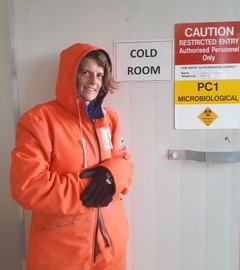Musselburgh School - Davina Hunt

2020 | Research informed responses to climate change in South Dunedin
School: Musselburgh School
Host: University of Otago, He Kaupapa Hononga (Otago’s Climate Change Research Network)
Region: Otago
Musselburgh School is committed to developing science leaders who provide real-life opportunities for our diverse community to understand the Nature of Science and how it impacts our lives. By investing in two teachers in the Science Teaching Leadership Programme, we aim to broaden existing partnerships as a Silver Enviroschool and part of the Otākou STEAM Cluster.
The school believes that enriching its staff capacity and capability in teaching science and recognising science alongside other worldviews will enhance students’ science capabilities to inspire a deeper understanding of themselves, each other, the world we live in and their ability to contribute in their community.
Prior to primary teaching, Davina spent over 20 years committed to enhancing curiosity, engagement and achievement in science and environmental sustainability working at multiple levels, from strategic planning and advising in government, collaborating with iwi and NGOs, teaching adults, tertiary, secondary, primary, early childhood students and teachers outside the classroom.
Davina believes in ‘keeping it real’, getting to know the personalities, backgrounds and abilities of individuals and offering authentic opportunities for learning to help develop students’ intrinsic motivation to share new ideas and form pathways for learning.
Davina slicing thin sections of Antarctic sea ice with a microtome at -20°C to observe changes in crystal structure at different depths through polarised light.
She worked in the Physics, Management and Surveying departments at the University of Otago with academics who are part of He Kaupapa Hononga: Otago’s Climate Change Research Network.
During her placement she investigated in science by helping PhD and MSc student projects in the Physics Cold Room, working at -20°C to produce 1mm thin sections of a 2m sea ice core and 5mm thick sections of a 58m glacial ice core from Antarctica and taking photos through a polarised lens in order to observe crystal shape and orientation.
From sampling a sea ice core, she learnt that granular ice forms at the surface as the ocean cools through heat loss to the atmosphere and is supercooled in the top layer. Grease ice forms and gradually grows more solid, then below the solid surface, sea ice grows as columnar ice with small bright specs of frazil crystals sometimes seen floating up from the ocean. Deeper in the core, heat loss to the ocean beneath causes platelet ice growth and all these transitions are visible in the core. These samples enhance understanding of how sea ice forms and melts and how glaciers move, all pieces of the collaborative puzzle to determine the rate of climate change and sea level rise.
Davina also collaborated with lecturers to provide authentic learning opportunities to students. In physics, she mentored Energy Practice postgraduates to conduct Type 1 and 2 Energy Audits at Musselburgh School with help from keen Year 5-6 students. Their recommendations will help the students, staff and Board make decisions about their energy behaviours, maintenance and upgrades with a better understanding of the energy system at school and our impacts on it.
In surveying, she helped align the debate topics of an Environmental Engineering course to explore the same future-focused issues as schools across the city for the Dunedin 2040 Project. These included possible solutions to rising sea level in South Dunedin, types and scale of green infrastructure and sustainable transport options. Filming these postgraduate evidence-based science debates has created a resource for local schools to help inform their STEAM projects, while enabling surveying students to gain skills in researching and communicating in science.
The highlights of Davina’s experience have been networking with a multidisciplinary team to experience different perspectives on climate research and improving her professional practice through conversations about science, mātauranga Māori, education, leadership and student support at the University of Otago, noho marae and with other STLP Participant Teachers. She is highly motivated to share her new learning with colleagues, students, school community and her local cluster of schools focused on STEAM, to implement a new Science Development Plan over the next 18 months.
